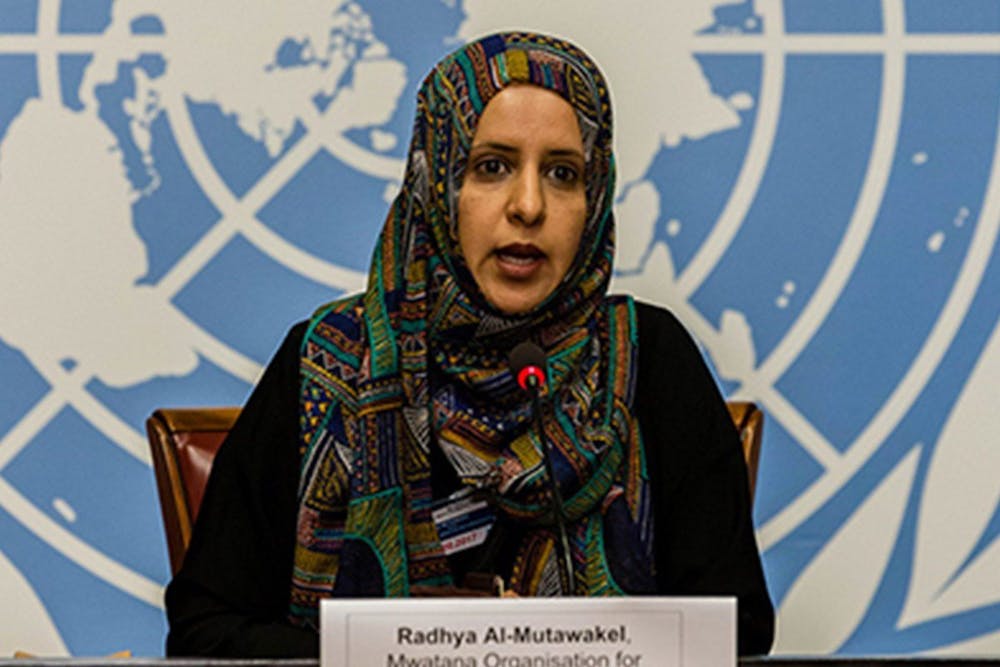The Foreign Affairs Symposium (FAS) hosted Radhya Al-Mutawakel on Feb. 24 to discuss her ongoing work against the Yemeni Crisis. Al-Mutawakel was the first speaker of the 2021 FAS, themed “Where Do We Go From Here?” The event was moderated by FAS Co-Directors Ryan Ebrahimy and Margaret Hanson.
Al-Mutawakel has been a Yemeni human rights defender for over 20 years. She co-founded the Mwatana Organization for Human Rights, which is an independent organization focused on safeguarding and documenting human rights violations in Yemen. Mwatana was nominated for a 2021 Nobel Peace Prize with the Campaign Against Arms Trade, and Al-Mutawakel was named as one of Time magazine’s 100 most influential people in 2019.
Al-Mutawakel described the pitfalls that led to the Yemeni Crisis.
“[Yemen] used to have small wars here and there, but at the same time we used to have diversity in political parties, media and civil society. We used to have elections, fake ones, but still elections,“ she said. “There was a huge collapse of the state, and Yemen is [now] controlled by armed groups.”
The crisis in Yemen escalated in 2015 and has since become the world’s largest humanitarian crisis. According to the United Nations (UN), 24.1 million people are in need of aid due to famine, lack of public services including sanitation, water shortages and needs for shelter.
Junior Husain Hakim stressed that Al-Mutawakel’s talk deepened his understanding of the ongoing conflict.
“One thing that stood out to me was her mention of there being no ‘good guys’ in the Yemeni conflict,” he said. “Her perspective showed me that there is blood on all parties’ hands, which taught me that the crisis is extremely complex and not so black and white.”
Al-Mutawakel discussed the steps that the Biden administration has taken to remedy the situation in Yemen, which she said was unique compared to actions taken by past administrations.
“It is a huge shift. It's not only that they said they will stop supporting the war, but they also appointed a special envoy to Yemen, so it shows another level of engagement,” she said. “I'm very optimistic, but still need a lot of work [for it] to become a real effect.”
Freshman Shreya Sriramineni expressed that, although she wished the event were in-person, she still found it very engaging.
“I haven’t been following the humanitarian crisis in Yemen too closely, but this event really showed me the extent of how dire it actually is,” she said. “[Al-Mutawakel] seemed very optimistic about the future. It’s right to feel that way [since the] Biden administration is showing signs of progress to work towards, as a stark contrast to the Trump administration.”
So far, the newly instated Biden administration has increased the number of refugees accepted by the U.S., halted support for offensive military actions and temporarily stopped arms sales to Saudi Arabia and the United Arab Emirates.
Al-Mutawakel explained that the developments from the Stockholm Agreement have been integral to resolving the conflict.
“The Stockholm Agreement is a very good example to show that when the international community decides to [apply] pressure, they can do it,” she said. “The only way to stop the war in Yemen is to keep pushing for peace in the international community, but it's not only the UN — it's the states behind the UN.”
The Stockholm Agreement was brokered by the UN in 2018 between the parties of conflict in Yemen. It aimed to secure critical ports, ceasefires in certain areas and prisoner exchanges between the parties. It was the first major initiative where the parties met. However, the agreement has been criticized for not being fully implemented and resulting in limited changes.
She discussed further actions that the U.S. can take to find solutions for the conflict, including taking a more active role in placing pressure on the international community.
“The U.S. can push for referring the human situation to the [International Criminal Court], which is very important. They can push to change the resolution to another resolution that will have a space for all parties to the conflict to be at the table and enhance accountability,” she said. “There are many easy actions that can make the situation less miserable.”
Al-Mutawakel emphasized that despite its downfalls, she still loves her home country and the Yemeni people. She remains optimistic that a solution can be reached.
“None of the parties to the conflict are really strong. They have all failed to win,“ she said. “Yemeni people are very peaceful, and they believe strongly in the role of law,“ she said. “I love Yemen. Sometimes I don't know why, but it's my country, and I'm sure that if you have the chance to visit Yemen then you will love it very much.”
Senior Natalia Woo especially enjoyed Al-Mutawakel’s optimistic narrative on the Yemeni conflict.
“Her speaking was incredibly inspiring and glimpsed a raw perspective into a conflict that usually feels very distant for our demographic, American students, who have never been directly exposed or engaged with it,“ she said.
Chris H. Park, the programming director of FAS, is a News & Features Editor for The News-Letter. He did not contribute reporting, writing or editing to this article.
Correction: In a previous version of the article, it was stated that Ryan Ebrahimy is the co-president of FAS. He is the co-director. The News-Letter regrets this error.





